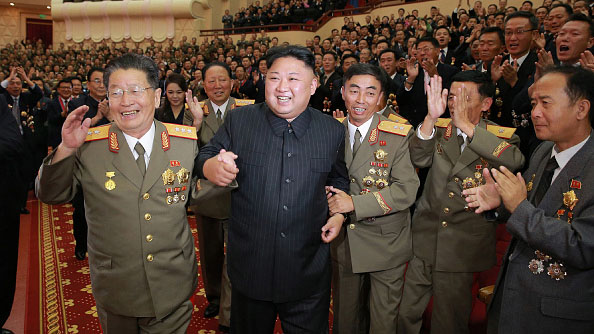President Trump will meet with North Korean leader Kim Jong Un by May for high-level talks toward a nuclear-free Korean peninsula, South Korean national security adviser Chung Eui-yong said outside the White House on Thursday.
It would be the first face-to-face meeting in history between a U.S. president and a North Korean leader.
The announcement comes days after North Korea said it was open to talks and offered to suspend nuclear missile and weapons tests during them.
Here are answers to the key questions about the latest development.
Is North Korea serious about giving up its nuclear arsenal?
Probably not, but if it consents to talks and suspends nuclear tests as promised, it still could result in progress that further defuses tensions.
“It’s not an unconditional commitment to get rid of its nuclear program,” said Robert Einhorn, an arms control analyst at the Brookings Institution. “It’s not clear they’re committing to anything at this point.”
Still, analysts say that holding talks can sometimes yield unanticipated results. “It is a big window of opportunity,” said Jenny Town, assistant director of the U.S.-Korea Institute at Johns Hopkins School of Advanced International Studies.
Should the United States trust North Korea?
There are plenty of reasons to be skeptical. “We shouldn’t be under any illusion that they are going to give up nuclear weapons easily,” Town said.
Previous efforts to contain North Korea's nuclear arsenal, including an agreement in 1994, ended in failure amid strong evidence that North Korea was moving ahead with an enrichment program despite the deal with the United States.
North Korea has also regularly objected to visits from weapons inspectors during previous discussions of disarmament, said Balazs Szalontai, an associate professor at Korea University.
More recently, Kim has raced ahead with an expansion of his nuclear arms program, testing a record number of ballistic missiles. The missiles are now capable of reaching U.S. cities.
What does North Korea want in return for agreeing to talks?
North Korea said they want security guarantees in return for talking about nuclear disarmament, but have not said what they mean by that.
Pyongyang has frequently complained about the regularly scheduled joint U.S.-South Korea military exercises that they say are a dry run for an invasion of the North. However, there was no insistence that the United States and South Korea suspend the exercises, Chung said.
They might ask for a reduction of U.S. forces in South Korea or an end to the security pact between the United States and South Korea. The U.S. has more than 25,000 troops based in South Korea.
North Korea would also likely want the lifting of international sanctions that have pinched the nation’s struggling economy. In previous negotiations, they have also asked for financial incentives. In the 1994 agreement, South Korea agreed to pay most of the $4 billion cost for light water reactors in North Korea to replace reactors that could produce weapons grade plutonium.
Duyeon Kim, visiting senior research fellow at the Korean Peninsula Future Forum, cautioned that Pyongyang and Washington likely have very different ideas on what denuclearization would entail and what the end goals for each country are. She said if the White House comes away from these talks convinced North Korea won't abandon its weapons after negotiations, it could then prompt a military response.
"A potential risk is that if Washington believes Pyongyang is not interested in abandoning weapons even after talks, then the White House might be further convinced that it should use military force to solve the issue," she said. "That's the potential risk."
Why is the North making this offer now?
It is the result of efforts by South Korean President Moon Jae-in to ease tensions on the peninsula and get the United States and North Korea to talk with each other.
The first step was getting North Korea to accept Moon’s invitation to participate in last month’s Olympics in Pyeongchang, South Korea. That paved the way for this week’s visit by members of the Moon administration to meet with Kim.
But it wasn't Moon's diplomatic efforts alone that led to Tuesday's announcement. North Korea has been feeling economic strain brought about by international sanctions, which are part of the Trump administration's strategy of bringing "maximum pressure" to bear on Kim's regime. “They want to alleviate the pressure,” Einhorn said of the North's regime.
Conditions in the country could also be spurring the efforts. The Wall Street Journaland CNN reported that sanctions led China to drastically clamp down on trade across its border areas with North Korea, one of the main sources of hard currency and goods into Kim's country. Observers say the impact is being sharply felt in North Korea through factory closures and rising prices.
A North Korean soldier who defected across the demilitarized zone that divides the two countries in November also revealed shocking levels of deprivation. Doctors found enormous parasitic worms in his digestive tract and raw kernels of corn in his stomach. Soldiers are higher up on the rations list than ordinary citizens, so the uncooked corn was an alarming sign.
Why is it a big deal that Trump himself is going?
Leaders from the two countries have never met face to face. A meeting of top leaders makes the possibility of a major breakthrough more likely, since they can make immediate decisions that subordinates couldn't. A summit like this also raises expectations and builds momentum, which could also hasten a decision that would lead to denuclearization.
What could go wrong?
Plenty. If the two leaders fail to reach an agreement it could be a major setback for efforts to find a solution to North Korea's nuclear buildup. With the two leaders holding the talks there is little margin for error and it would be difficult to pick up the pieces of a failed summit. The meeting would give Kim the prestige he craves, but if he doesn't make any concessions to the United States it will look like Trump was outsmarted. That could wind up heightening tensions.
What’s the next step?
In addition to the announcement that Trump will meet with Kim by May, South Korea said Moon and Kim would hold a summit in late April in the demilitarized zone that divides the two countries. The Trump administration is likely to closely watch that meeting and other actions by North Korea to assess how serious Kim is about denuclearization before agreeing to talks.
"The World is watching and waiting!" Trump said in his tweet Tuesday.
Is unification on the table?
AOlder generations of Koreans on both sides of the border looked toward a time when the two countries would be united.
But younger generations, who have no memory or little connection to the 1950-53 Korean War, generally see only the cost of integrating the much poorer North into the South's much larger economy.
Moon’s policy reflects this view, analysts say. “Moon has prioritized peaceful coexistence over unification,” Town said.
Contributing: Tom Maresca from Seoul.


